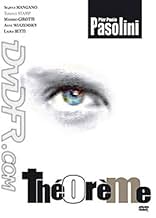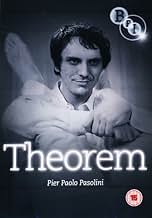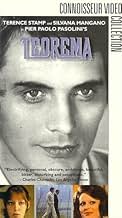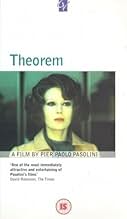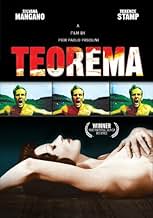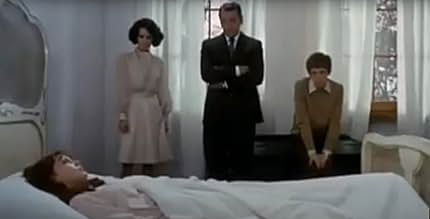Um jovem misterioso seduz cada membro de uma família burguesa. Quando ele sair de repente, como suas vidas vão mudar?Um jovem misterioso seduz cada membro de uma família burguesa. Quando ele sair de repente, como suas vidas vão mudar?Um jovem misterioso seduz cada membro de uma família burguesa. Quando ele sair de repente, como suas vidas vão mudar?
- Direção
- Roteirista
- Artistas
- Prêmios
- 1 vitória e 5 indicações no total
- Second Boy
- (as Ivan Scratuglia)
- Interviewer
- (não creditado)
- Old Peasant
- (não creditado)
Avaliações em destaque
"A theorem is a proposition that has been or is to be proved on the basis of explicit assumptions...
Pier Paolo Pasolini's "Teorema" (1968) is a fable that tells how a handsome young man (extremely attractive Terrence Stamp "with the eyes of an angel and the grin of the devil") stays as a guest in the house of a wealthy factory owner and seduces one after another all members of the household - the maid, the teenagers son and daughter, the wife, and the father (in this order). When released in 1968, the film had divided believers and atheists as much as critics. Some of Pasolini's comrades-Marxists were also infuriated by this attack on their ideology. Many viewers were disturbed by its removing sexual taboos even though sex is handled very tastefully. It is more a symbol of connection and closeness to God (or it could be to Devil, we may only guess). Made almost forty years ago, "Teorema" seems to be simple and puzzling at the same time. It reminded me Ingmar Bergman's movies from his "Trilogy of Faith" which sums up Bergman's own philosophy regarding religion and God "God has never spoken because He does not exist". In Bergman's world where God does not exist, communication and understanding are not possible and everyone is locked in their loneliness like in a cage. In Pasolini's film, God sends his angel to a chosen family. He has spoken to them and known them but then he left them. Did they become happier? Is that possible for a human to keep on living like nothing happen after the encounter with God?
I watched "Teorema" for the first time few weeks ago but I still think about it trying to understand what "theorem" Pasolini tried to prove? I also was thinking about the films that were inspired by or reminded me a lot about "Teorema". I've mentioned Bergman already. Luis Bunuel with "Nazarin", "Viridiana"," Belle de jour" (1967) - the mother's transformation in "Teorema" reminds about the film immediately, and "Le Charme discret de la bourgeoisie"(1972) come to mind. I was also reminded of Andrei Tarkovsky. The visual style, camera work and the use of music in "Teorema" seem similar with Russian Master's. His last film, "Sacrifice" may be the one closest to Pasolini's film.
I would never say that everyone must watch "Teorema". It is a very unusual film that could be easily dismissed as ridiculous and dated or it would be thought of as absolutely brilliant and mysterious. I have not decided yet but I can't forget it.
P.S. November 29, 2006 - It's been several months since I saw "Teorema" and now I believe that it is brilliant and belongs to the the best films ever made. One can meditate forever on its depths and mystery, and that's the sign of a great work of Art for me.
A beautiful and enigmatic visitor (a young Terence Stamp, one of the intriguing, almost androgynous cult sex figures of the 60's, along the lines of a Udo Kier and others) seduces and then leaves each member of a bourgeois family. The father (Massimo Girotti, of Visconti's "Ossessione"), the mother (Silvana Mangano, "Death in Venice"), the daughter (Anne Wiazemsky, of Bresson's "Au Hasard Balthazar" and Godard's then wife), the son (Andrés José Cruz Soublette) and even the housemaid (Laura Betti, best actress at the Venice Film Festival for this performance) are all altered by the visitor's sexual presence in their lives, and each will try to find salvation or catharsis once they're abandoned. Their ways can be seen as an allegory of the fears and misconceptions of those trapped in their own conventions, and the tragic consequences of their failed attempts to get away - after the visitor, an hedonistic angel of death, tricked them with false hopes of sexual and emotional liberation. At least, that's how I see it - which I wouldn't dare to claim as an ultimate view on it. As enigmatic and haunting the images in "Teorema" are, they ask for repeated viewings. And just the fact that they give you enough interest for a second look, it's quite a feat. An interesting, cerebral cinematic exercise, to say the least. 8.5/10.
The family without a surname is led by Paolo (Massimo Girotti), the owner of a factory whose decision to give his industrial center to his workers is the subject of the opening of the film, a documentary-like interview with labor leaders from the factory who refuse to give any credit to their bourgeois boss, even as he does things that they want like devolve ownership to the workers, the interviewer asking if the bourgeois can never do anything good while the labor leader insists that it's only a ploy to make everyone bourgeois and avoid class conflict and warfare (communists are so...tiresome).
Where this actually happens in the story is unclear, actually, but the meat of the film is about the Visitor (Terrence Stamp), a young student known by Paolo's son Pietro (Andres Jose Cruz Soublette) who invites the Visitor to spend time at the large house the family calls home. The Visitor barely speaks, merely having a fascinating presence (the casting of Stamp is one of the best decisions in the film) and the showing of erotic but surrealist art to Pietro, awakening something within him. This awakening extends to Pietro's sister Odetta (Anna Wiazemsky), the mother Lucia (Silvana Mangano), as well as the maid Emilia (Laura Betti). The awakenings are mostly sexual in nature, though the Visitor's awakening of Paolo, while physical, is more therapeutic than sensual.
What is the Visitor? Honestly, this is one of those questions I never care about. I leave it as he's some kind of disruptive force who sweeps through the house and then leaves like a season or a storm. Is he angelic? Is he demonic? That's a level of symbolic reading that never interests me. The point is the effect, though, and the effect is what's interesting. This bourgeois family, living lives so empty of meaning, are completely thrown into chaos with the introduction of one outside element that shows them more than the pristinely curated view of the world they've known. It's a common critique of the bourgeois from leftist sources. It never strikes me as terribly realistic or insightful, but I think this film is helped by the fact that it's less strictly realistic and more purely metaphorical in intent. That creates emotional distance that something like Accattone was able to engage in, but the movement is still interesting.
The Visitor simply leaves the family, and the family reacts badly in different ways. Pietro leaves the family to become an artist (including pissing on a blue canvas because that's what he needs to do to recreate the presence of the Visitor, obviously something Pasolini did not find beautiful in its own right, making it fairly clear that he does not see this opening of the eyes purely good, probably because this bourgeois family is so unconnected to the world that they don't know how to process it). Odetta becomes completely catatonic. Lucia prowls the streets for random sex from young strangers who mostly remind her of The Visitor. Lucia becomes an ascetic who returns to her rural community, remains seated in one place drinking nothing but nettle soup, and then becomes some kind of holy figure climbing to the top of a building and floating in the air to the amazement of those around her. Paolo has a complete breakdown (it's very possible his giving away of the factory actually happens here), and he strips naked in Termini station before finding himself on the slopes of Mount Etna.
What does all of this mean? It means that Pasolini was a Marxist who hated the bourgeois and found them ridiculous, disconnected, and hopeless. Honestly, it's not the most interesting message because it's so rote. However, the delivery is what carries it. Pasolini had become known for his worldly, wordy films that used common Italian dialects instead of the Florentine while filming naturalistically (on the surface in the style of Italian neo-realism, but he wouldn't agree that he fell into that categorization), and here, in Teorema, he presents this theory of his on the bourgeois surrealistically and quietly. It's a distanced portrait of a family of four breaking down, and the actual steps of everyone's movements are interesting to me, even if the subtext ends up feeling shallow.
It's not one of Pasolini's great films, but I find Teorema to be something I can't quite ever take my eyes off of. I've actually seen it twice now, and I do appreciate it for its oddball portrait of a family in disarray towards destruction.
Você sabia?
- CuriosidadesAt the 1968 Venice Film Festival, the film was given an award by the International Catholic Film Office. The award was withdrawn after critical remarks by Pope Paul VI. After the festival the film was confiscated by Italian police and Pier Paolo Pasolini charged with obscenity, but acquitted.
- Erros de gravaçãoWhen Lucia (the mother) leaves the house to go cruising for men, she is wearing a white coat. The first camera shots of her in the car also show the coat. However when she spots a young man and stops the car, the white coat is gone and now she's wearing a dark orange coat.
- Citações
Lucia, the mother: I realize now that I've never had any real interest in anything. I don't mean anything grand. Just the simple, everyday interest my husband takes in his work, or my son in his studies, or Odetta in family life. I've had nothing like that. I don't know how I lived with such emptiness, yet I did. If there was anything at all, some instinctive love of life, it has withering away - like a garden where no one ever goes. Actually, that void was filled with false and wretched values, an appalling jumble of misguided ideas. Now I see: You filled my life with a real and total interest. So by leaving, you're not destroying anything that was there before, except my chaste bourgeois reputation. Who cares about that?
- ConexõesEdited into Histoire(s) du cinéma: Seul le cinéma (1994)
- Trilhas sonorasRequiem
KV 626
Written by Wolfgang Amadeus Mozart
Performed by Russian Academy Choir and Moscow Philharmonic Orchestra
Courtesy of MK Records
Principais escolhas
- How long is Teorema?Fornecido pela Alexa
Detalhes
- Data de lançamento
- País de origem
- Idiomas
- Também conhecido como
- Theorem
- Locações de filme
- 16 Via Palatino, Milan, Lombardia, Itália(family house)
- Empresas de produção
- Consulte mais créditos da empresa na IMDbPro
- Tempo de duração
- 1 h 38 min(98 min)
- Cor
- Proporção
- 1.85 : 1



